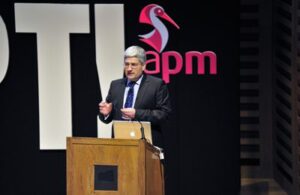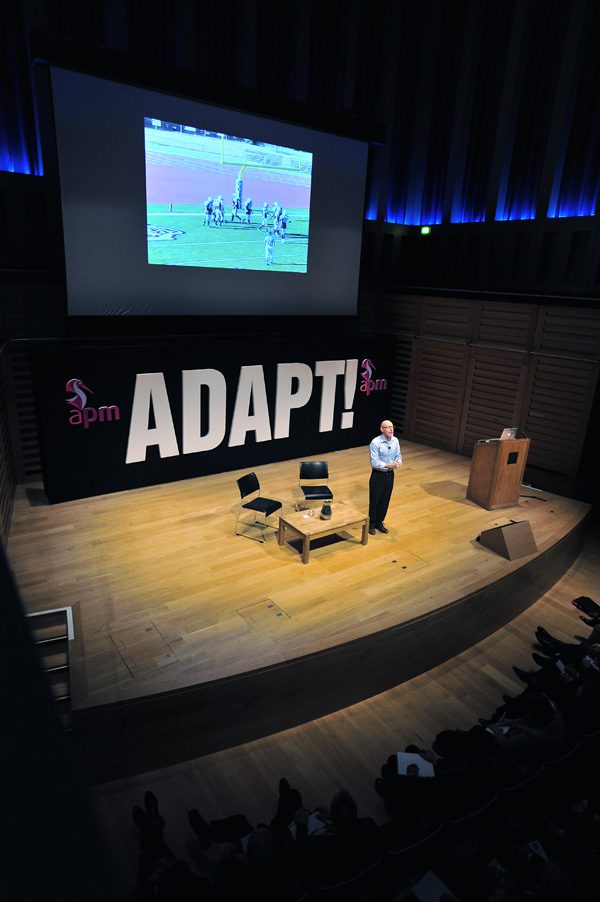httpv://www.youtube.com/watch?v=CB82fbR-qoY&list=PLQzq_ylfBVzLf702M93x0BXkkPi6Uce4d&index=14
Conference chair Professor Darren Dalcher (pictured right) opened the seventh annual APM Project Management Conference by setting the scene, describing 2012 as the year project management came of age.
 He told delegates at London’s Kings Place: “Adapt is the next chapter in the conversation for the profession. It is about evolving, creating alternatives and finding ways of dealing with change.”
He told delegates at London’s Kings Place: “Adapt is the next chapter in the conversation for the profession. It is about evolving, creating alternatives and finding ways of dealing with change.”
Translating strategy into execution is the role of the project manager, he added, as he outlined the climate in which practitioners are operating. “We are under pressure to deliver much more with less, we have had to become change animals, not waiting until the crisis is over to deliver, but adapting and being ready at all times.”
He outlined the theory behind each of the conference’s three streams – flexibility, resilience and evolution – and challenged delegates to join a stream that they wouldn’t normally visit and to make at least one new connection.
Before introducing the opening speaker of the day, Darren quoted physicist Professor Stephen Hawkins, saying, intelligence is the ability to adapt.
“We want to be intelligent,” he added.
An overriding theme of the day was collaboration. In each of the three streams, speakers and chairs and delegates discussed its importance in relation to all elements of a project.
“We are about people and diversity,” said Darren. “The need for different skills and perspectives is important so we don’t get tunnel vision and get set in our ways.
“Conversations are very powerful and having different viewpoints prevents this tunnel vision.”
Mary McKinlay, APM Board member and chair of the Resilience stream, agreed. She told delegates: “Project managers are resilient because they don’t work on their own. The project manager doesn’t do it all. They use their team.
“If we want to be resilient and get our projects through, we need to rely, depend on and use our support.”
It was a sentiment echoed too by Bechtel principle vice president Bill Henry, who was presenting to delegates on delivering a breakthrough rail project. He asked: “The question is do we collaborate far and wide enough for our projects?
“We need to encourage openness and trust and in order to do that, we have to cast the net wide even to consumers and media. Be as transparent and as collaborative as you can and you will be amazed at the results.”
 In the business of delivering amazing results was the opening speaker of the APM Conference, who set a very high bar in Hall One of Kings Place.
In the business of delivering amazing results was the opening speaker of the APM Conference, who set a very high bar in Hall One of Kings Place.
Professor Richard Wiseman (pictured left), the magician-come-psychologist-come public speaker, had some interesting theories on the importance of psychology in project management.
In an entertaining, enlightening and informative presentation, he discussed the psychology of luck and the notion of how we make our own luck by our thinking and behaviour.
For example, if you can see more opportunities in life and take them this will make you a luckier person and, in regards to projects, will make them more successful. He said: “Bad things happen in life, that is a fact, but it is about perception. If you can see something as lucky, even things that don’t seem that way, you may be able to find an opportunity in it.”
He added: “Even small changes can make a big impact. Navigate with your eyes wide open.”
Tim Harford, the ‘Undercover Economist’, addressed delegates at the end of the day with a compelling history lesson which demonstrated the importance of embracing mistakes.
“Success inevitably means failure. Embrace failure to truly understand how success works,” he said.
Through a number of historical examples he highlighted both unproductive and productive failures. He added: “Project managers need to have productive failure. Make mistakes in a good direction.”
A full round up on the 2013 APM Conference will feature in July’s issue of Project magazine.
#apmconf
Watch more interviews with the speakers from the APM Project Management Conference 2013.

